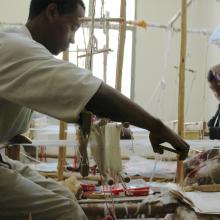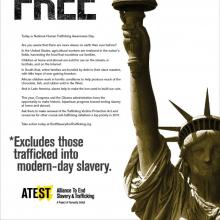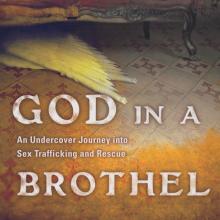sex industry
The smoke, the loud music, and the smell of perfumes trigger uncomfortable memories for Polly Wright.
But Wright ignores those reminders of her past as she and a troupe of women make their way to the strip club’s dressing room to deliver gift bags filled with fingernail polish, colorful earrings, and handwritten notes with messages such as “I’m praying for you.”
The bags also contain tubes of lip gloss with contact information where dancers can receive help and support. A finger can cover the tiny print so a pimp or abusive boyfriend can’t see it.
“We are in there saying, ‘You are loved, valued, and cherished, and you are not alone,’” said Wright, founder and executive director of We Are Cherished, a faith-based organization that regularly visits more than 50 adult entertainment venues throughout the Dallas-Fort Worth area.
When I think of weavers, what comes to my mind are the ladies in the back of the knitting store in my Southern California hometown, the ones who hang out on weekend afternoons with their handlooms – weaving cloth shawls, blankets, or the occasional modern tapestry.
Here, weaving is, by and large, a pastime. Some would call it an art form. The ladies in the back of the knitting shop are craft weavers. We might consider them "artisans" and laud them for mastering the truly ancient craft.
In the West, machines do most of the commercial weaving, not people. In Ethiopia, and elsewhere in the developing world, handloom weaving is most often an occupation for men and one that isn't usually heralded for its artistry. Weaving isn’t a prestigious job and, by and large, those who weave are the working poor.
Today people across the nation (and the blogosphere) are taking part in National Human Trafficking Awareness Day, which encourages participants to get educated and get active in the fight to end the suffering of the estimated 27 million persons living in slavery today.
In his speech declaring January to be National Slavery and Human Trafficking Prevention Month, President Obama intimated a serious commitment to the fight to end modern slavery. This year, Obama and Congress have the opportunity to make historic, bipartisan progress toward this worthy goal.
And it’s not just government that’s getting involved. Just last week, over 42,000 young Christians banded together at Passion 2012 to raise more than $3.1 million dollars to fund organizations fighting to bring prevention, freedom and restoration to those trapped in slavery.
Sojourners has long been committed to the fight to end this abhorrent evil, and the current issue of Sojourners Magazine seeks to engage the topic head-on.
Inside, we invite you to explore our coverage and involvement in the fight against human trafficking over the past year!
You need to read God in a Brothel because:
- 30 million people are enslaved around the world,
- It’s a $32 billion industry per year,
- 2 million children are enslaved in the sex trafficking industry,
- 100,000 of these children are living right here, in the United States.
The sex trafficking industry would not exist without the demand for commercial sex that flourishes worldwide.
The church played a central role in the Civil Rights and anti-apartheid movements. Now the church has the power -- and the responsibility -- to fight human trafficking with all of its rich resources.



